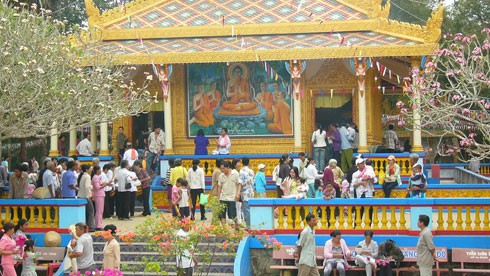(VOVworld) – The 17th session of the Vietnam - US Human Rights Dialogue opens in Hanoi on Friday. The dialogue has been organized by the two countries for many years, aiming to improve understanding on human rights and boost Vietnam – US relations. Unfortunately, prior to the Dialogue, the US House of Representatives held a hearing to consult independent observers on human rights in Vietnam. The independent observers turned out to be organizations and individuals who want to take advantage of “human rights” to sabotage Vietnam.

Khmer ethnic people in the southwestern region celebrate Chol ChnamThmay festival (vov.vn) |
If the hearing organized by the House of Representatives on April 11 in Washington truly aimed to consult the opinions of independent observers on human rights in Vietnam, the participants should have been knowledgeable and responsible human rights activists, organizations, and individuals who represent impartiality, objectivity, and independence. But at the hearing were people with a record of opposing and distorting human rights issues in Vietnam. A typical figure is Vo Van Ai, who has colluded with political opportunists in Vietnam and other hostile forces to take advantage of religion, democracy, and human rights to incite opposition against Vietnam. John Sifton, the Asia Advocacy Director of the group Human Rights Watch, has regularly used the trials of law violators to smear human rights in Vietnam. Another is Tran Tien who calls himself “a human rights victim”. In fact, he violated the law and was tried for causing social disorder in Con Dau in Da Nang city. Clearly, the hearing held by the US House of Representatives can’t claim to have consulted “independent views” because the participants have distorted the real human rights situation in Vietnam.
The Committee on Foreign Affairs of the US House of Representatives has organized many of these so-called “hearings” on human rights in Vietnam, which always confirm their biased attitude on the issue. Prior to the hearing, Christopher Smith, chairman of the US Lower House Subcommittee on Human Rights said the hearing would focus on Vietnam’s human rights violations, particularly with regard to religion and ethnicity. Smith said special witnesses would give persuasive arguments why the US State Department should deal firmly with human rights violators in Vietnam at the Human Rights Dialogue on April 12. With such negative preconceptions, the “hearing” was not aimed to collect “independent views” but to use human rights as a pretext to further schemes to sabotage Vietnam.
Vietnam and the US are both well aware of the social and humane nature of human rights. Since bilateral relations were normalized in 1995, 16 dialogues have been held to discuss each side’s priorities and concerns about human rights and democracy. At the last dialogue in Washington 2 years ago, Vietnam touched upon problems in the US’s protection of human rights and freedom, including the torture and mistreatment of prisoners and discrimination against minority groups and immigrants. The purpose of the dialogue is to narrow differences and increase mutual understanding about human rights and to build a constructive and friendly partnership and multifaceted cooperation based on equality and mutual respect and benefit. Despite efforts by anti-Vietnam organizations and individuals to distort human rights in Vietnam and organize hearing-like events to criticize Vietnam, dialogue between Vietnam and the US will continue because it is in the interests of both nations and their people.
Thu Hoa